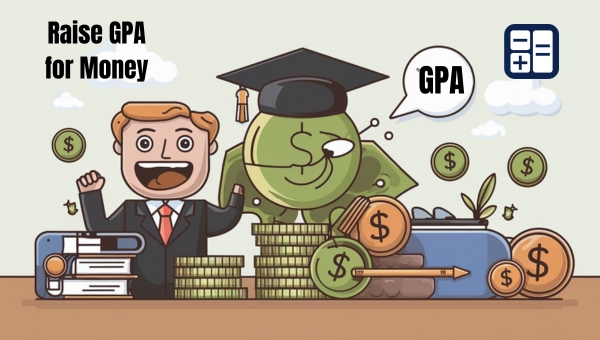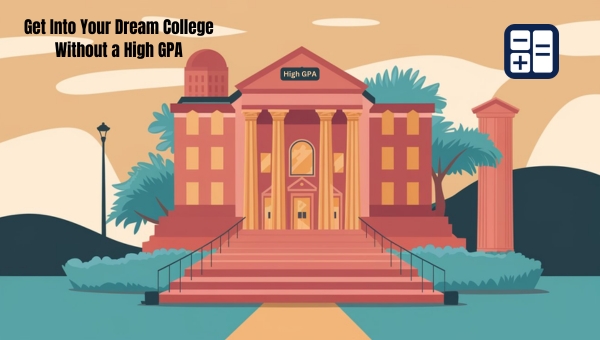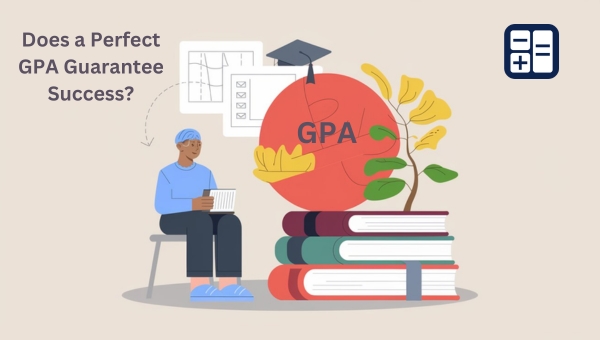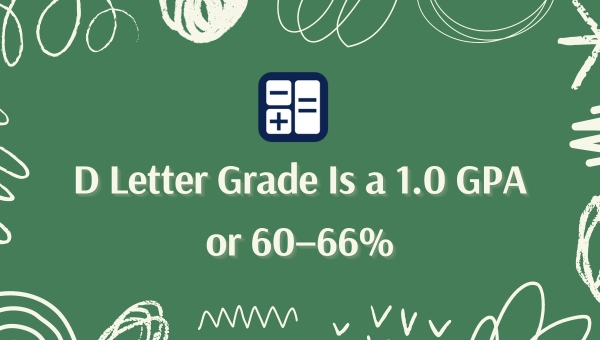D+ Letter Grade Is a 1.3 GPA or 67–69%
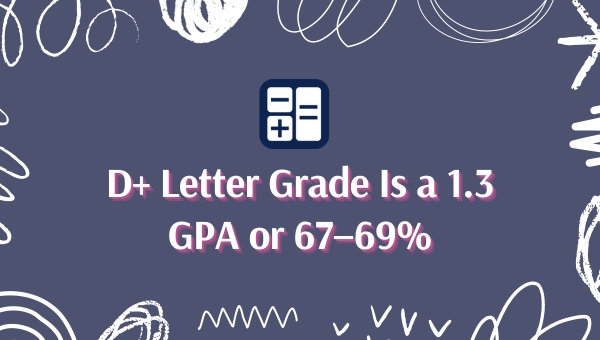
You’ve likely encountered the frustration of seeing a D+ on a report card, translating to a 1.3 GPA or a 67-69% score. This grade reflects not just a below-average performance but also a crucial moment for reassessment.
How does a D+ impact your high school journey, and what specific strategies can you adopt to rise above it? Understanding these aspects is key to transforming your academic future. So, what’s next for improving your GPA quickly and effectively?
What is a D+ GPA?
A D+ GPA typically indicates that a student’s academic performance is below average but not failing. If you have a D+ GPA, it means your grades are in the range of 67-69%. This percentage translates to a 1.3 on the 4.0 GPA scale. Essentially, you’re passing your courses, but just barely.
Understanding what a D+ GPA entails can help you grasp where you stand academically. It’s a clear signal that there’s significant room for improvement. This GPA can serve as a wake-up call to reassess your study habits, seek extra help, or talk to your teachers about ways to boost your performance.
While having a D+ GPA isn’t the end of the world, it’s important to recognize how it affects your academic journey. You need to take proactive steps to improve.
This might involve dedicating more time to studying, joining a study group, or utilizing school resources like tutoring centers. Small changes can gradually turn your grades around.
What does a D+ GPA mean for high school students?
A D+ GPA can significantly impact your college application process, shaping your list of safety, target, and dream schools.
With such a GPA, you’ll need to focus on safety schools where acceptance is more likely.
However, aiming for target and dream schools may require additional efforts like improving your grades or excelling in other areas.
Safety Schools
Navigating the college admissions process can be daunting, especially with a D+ GPA. However, all isn’t lost. You can still find safety schools that may accept you and provide a path to further education. Here’s how to approach finding the right safety schools:
- Community Colleges: These institutions often have open admissions policies, meaning they accept most students regardless of GPA. Starting here can help you improve academic skills and eventually transfer to a four-year college.
- Trade Schools: If you’re interested in specific trades like plumbing, electrical work, or culinary arts, trade schools focus more on skill acquisition than academic performance. They can provide certifications and job-ready skills.
- Less Competitive State Schools: Some state universities have less stringent admission requirements. Research schools with higher acceptance rates; they may be more accommodating of a lower GPA.
- Online Colleges: Many online institutions offer flexible admission requirements and can be a good fit if you’re looking to balance work, life, and studies.
Target Schools
Understanding what a D+ GPA means for high school students is crucial when identifying target schools. A 1.3 GPA or 67-69% can make finding the right fit challenging, but it’s not impossible.
Here’s what you need to consider when looking for target schools:
- Focus on Schools with Flexible Admission Criteria: Some colleges understand that GPA isn’t the sole indicator of potential. They may emphasize other aspects like personal statements, extracurricular activities, or letters of recommendation.
- Community Colleges: These institutions often have more lenient admission standards and can be an excellent starting point. Many students use community colleges to improve their GPA before transferring to a four-year institution.
- Specialized Programs: Look for schools offering specialized programs or support for students aiming to improve their academic standing. These programs can provide the resources needed to boost your GPA and academic skills.
- Test-Optional Schools: Some colleges have adopted test-optional policies, focusing more on holistic admission processes. If standardized tests are your strong suit, these schools might be more willing to overlook a lower GPA.
Dream Schools
Dreaming big despite a D+ GPA doesn’t have to be out of reach. Sure, a 1.3 GPA or 67–69% isn’t great, but it’s not the end of the road. You can still aim for those dream schools if you take proactive steps. Here’s how to make your dream a reality:
- Improve Your GPA: Focus on bringing up your grades during the remaining semesters. Seek help from tutors, join study groups, and make academics a priority.
- Excel in Standardized Tests: A high score on the SAT or ACT can compensate for a low GPA. Dedicate time to test prep and consider taking the test multiple times to achieve your best score.
- Showcase Extracurriculars: Colleges love well-rounded students. Get involved in clubs, sports, volunteering, or part-time work. Highlight leadership roles and significant achievements.
- Craft a Compelling Essay: Use your personal statement to tell your unique story. Explain any challenges you’ve faced and how you’ve grown from them. Admissions officers appreciate honesty and resilience.
Don’t let a D+ GPA discourage you. With determination and strategic planning, you can still make it to your dream school.
Proven Tips to Get a D+ GPA
To boost your GPA, start with a consistent study schedule and focus on your weak areas.
Make use of study groups and don’t hesitate to meet with your professors for extra help.
Effective time management will be key to balancing all these efforts.
Study Schedule Consistency
Consistency in your study schedule can be the difference between failing and barely scraping by with a D+ GPA. When you stick to a regular study routine, you’re more likely to retain information and keep up with coursework.
Start by setting specific times each day dedicated solely to studying. Whether it’s an hour in the morning or two hours in the evening, make it a non-negotiable part of your day.
Keep a calendar or planner to track your study sessions and assignments. This helps you visualize your workload and manage your time effectively.
Break down your study material into manageable chunks. Instead of cramming the night before, review a little bit every day. This method keeps the information fresh and reduces stress.
Eliminate distractions during your study time. Turn off your phone, close unnecessary tabs on your computer, and find a quiet place where you won’t be disturbed.
Consistency also means taking breaks. Short, regular breaks can improve focus and prevent burnout.
Focus on Weak Areas
Focusing on your weak areas can significantly boost your chances of achieving a D+ GPA. First, identify the subjects or topics where you’re struggling the most. Make a list and prioritize them according to difficulty. This will help you create a targeted study plan.
Next, break down these challenging topics into smaller, manageable sections. Instead of trying to tackle an entire chapter at once, focus on one section or concept at a time. This method makes the material less overwhelming and easier to comprehend.
Don’t hesitate to seek help. Ask your teachers for clarification on confusing topics, or look for online resources that explain the material in a different way. Sometimes, a different perspective can make a big difference in understanding.
Practice consistently. Work on problems or exercises related to your weak areas every day. Repetition reinforces learning and helps you retain information better.
Lastly, track your progress. Keep a journal or use an app to note improvements and areas that still need work. This will give you a clear picture of your progress and motivate you to keep going.
Utilize Study Groups
While honing your weak areas can significantly improve your GPA, another effective strategy is to utilize study groups. Working with your peers offers multiple benefits that can help you boost your grades.
Firstly, joining a study group creates a structured schedule, ensuring you consistently review and discuss material. This routine can be vital for retaining information and staying on track with your coursework.
In a study group, you also get the advantage of peer explanations. Sometimes, hearing a concept from a classmate can make it click in a way that a lecture didn’t. Additionally, when you explain topics to others, you reinforce your own understanding, making it easier to recall information during exams.
The group dynamic can also keep you motivated. Knowing others rely on you to show up and contribute can push you to stay committed.
Lastly, study groups provide a support system. Academic challenges feel less daunting when you have others to share the journey. You can discuss strategies, share resources, and even vent frustrations.
This camaraderie can reduce stress and build confidence, both of which are crucial for improving your GPA. In short, leveraging study groups can be a game-changer for your academic performance.
Meet With Professors
Meeting with professors can be a game-changer when you’re aiming to improve your GPA. They’re not just there to lecture; they’re valuable resources who can offer personalized guidance tailored to your needs.
Don’t hesitate to schedule office hours to discuss your struggles and get clarifications on difficult topics. Professors appreciate students who take initiative, and this can make a positive impact on your grades.
When you meet with your professors, come prepared. Bring specific questions or topics you need help with. This shows that you’re serious about improving and allows for a more productive session.
Ask for feedback on your assignments and tests to understand where you went wrong and how you can do better next time.
Building a relationship with your professors can also lead to additional support. They might offer extra credit opportunities, suggest useful resources, or even extend deadlines if you’re facing personal challenges.
Plus, they can provide insights into how to approach the course material more effectively.
Effective Time Management
Effective time management is crucial if you want to pull your GPA up from a D+. Start by creating a weekly schedule. Use a planner or digital app to block out time for classes, study sessions, and assignments. Prioritize tasks based on deadlines and difficulty.
Set specific goals for each study session. Instead of just saying, “I’ll study math tonight,” plan to complete two chapters or solve ten problems. This keeps you focused and makes your progress measurable.
Break larger projects into smaller, manageable tasks. If you have a big paper due, divide it into stages: research, outline, draft, and revision. Allocate time for each stage and stick to it.
Avoid multitasking. It’s tempting to juggle multiple assignments, but this often leads to mistakes and wasted time. Focus on one task at a time, and give it your full attention.
Limit distractions. Turn off notifications on your phone, find a quiet study space, and let friends know when you’re unavailable. This minimizes interruptions and helps you stay on track.
How to Raise Your GPA Fast?
Boosting your GPA quickly requires a strategic approach and dedication. Start by identifying the subjects where you struggle the most. Focus your energy and resources on these areas first. Consider seeking help from tutors, study groups, or online resources to strengthen your understanding.
Next, stay organized. Use a planner to track assignments, exams, and deadlines. Break down larger tasks into smaller, manageable chunks. This helps you stay on top of your workload and reduces the risk of last-minute cramming.
Don’t underestimate the power of good study habits. Find a quiet, distraction-free space to study, and stick to a consistent schedule. Active studying techniques like summarizing information in your own words, teaching concepts to someone else, or using flashcards can enhance retention.
Communicate with your teachers. Don’t hesitate to ask for feedback on your performance and seek advice on how to improve. They can provide valuable insights and may offer extra credit opportunities or additional help sessions.
Lastly, prioritize your health. Adequate sleep, proper nutrition, and regular exercise can significantly impact your cognitive functions and overall performance.
Conclusion
Raising your D+ GPA is definitely achievable with dedication and smart strategies. Reflect on your study habits, seek help when needed, and use available resources to strengthen your understanding of the material. Don’t hesitate to ask teachers for guidance or join study groups.
By taking these proactive steps, you’ll improve your academic performance and open up more opportunities for your future. Remember, consistent effort and a positive mindset can make a big difference in your success.
